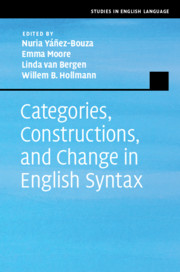Book contents
- Categories, Constructions, and Change in English Syntax
- Studies in English Language
- Categories, Constructions, and Change in English Syntax
- Copyright page
- Contents
- Figures
- Tables
- Contributors
- Acknowledgements
- Introduction: Analysing English Syntax Past and Present
- Part I Approaches to Grammatical Categories and Categorial Change
- Chapter 1 What Is Special about Pronouns?
- Chapter 2 What For?
- Chapter 3 Whatever Happened to Whatever?
- Chapter 4 Are Comparative Modals Converging or Diverging in English? Different Answers from the Perspectives of Grammaticalisation and Constructionalisation
- Chapter 5 The Definite Article in Old English: Evidence from Ælfric’s Grammar
- Part II Approaches to Constructions and Constructional Change
- Part III Comparative and Typological Approaches
- References
- Index
Chapter 2 - What For?
from Part I - Approaches to Grammatical Categories and Categorial Change
Published online by Cambridge University Press: 07 October 2019
- Categories, Constructions, and Change in English Syntax
- Studies in English Language
- Categories, Constructions, and Change in English Syntax
- Copyright page
- Contents
- Figures
- Tables
- Contributors
- Acknowledgements
- Introduction: Analysing English Syntax Past and Present
- Part I Approaches to Grammatical Categories and Categorial Change
- Chapter 1 What Is Special about Pronouns?
- Chapter 2 What For?
- Chapter 3 Whatever Happened to Whatever?
- Chapter 4 Are Comparative Modals Converging or Diverging in English? Different Answers from the Perspectives of Grammaticalisation and Constructionalisation
- Chapter 5 The Definite Article in Old English: Evidence from Ælfric’s Grammar
- Part II Approaches to Constructions and Constructional Change
- Part III Comparative and Typological Approaches
- References
- Index
Summary
The lexical item for is treated in the literature either as a preposition (We bought it for you) or as a subordinator/complementiser (I preferred for him to take the exam). In this chapter I will argue that there are good grounds for regarding for exclusively as a preposition which can license a noun phrase or clause as complement. In what follows I first take a closer look in Section 2.2 at constructions in which for appears.
- Type
- Chapter
- Information
- Categories, Constructions, and Change in English Syntax , pp. 54 - 80Publisher: Cambridge University PressPrint publication year: 2019

